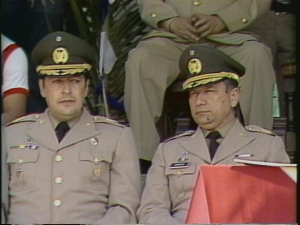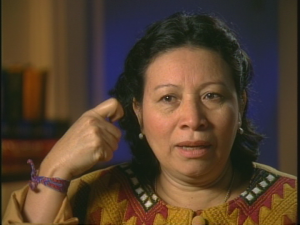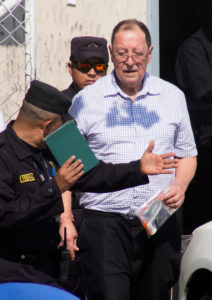JUSTICE & THE GENERALS—A documentary with legs!

A U.S. backed military regime; Crimes that shocked the world, Command responsibility in a U.S. courtroom
Justice & the Generals reports on the twenty-year saga to search for truth, justice and accountability in the case of the four American churchwomen who had been brutally raped and murdered in El Salvador in 1980.
The 90 min. film follows the two decade effort of the families of the churchwomen to pursue information from both the Salvadoran and the U.S. governments. They decided to take their case to a U.S. courtroom once they discovered that the two leading Salvadoran Generals from the era of their sisters’ deaths were now residing in Florida. They utilized what were then new and re-purposed U.S. laws in an emerging global movement of human rights law: universal jurisdiction, the Alien Torts Claims Act, the Torture Victims Protection Act and, most importantly, the “command responsibility” doctrine that hadn’t been mobilized since the trials in Japan following WWII.
The families’ pursuit for justice ended up in a West Palm Beach courtroom in 2000. The two Generals who sat in the dock had once headed the army and a notorious National Guard during El Salvador’s civil war in the 80s—Generals Guillermo Garcia and Vides Casanova.

While the film tells the story of the two decades of detective work to get to that trial and the legal arguments underpinning it, the jury decided against holding the Generals liable. When I interviewed the jurors after the verdict they explained they got caught on two words in the Judge’s instructions, “effective command.” But another trial was on its way against the Generals. At the end of the film, I include interviews with several Salvadoran survivors of torture who were about to confront the same two Generals in that same West Palm Beach courtroom.
At the time that “Justice & the Generals” aired on PBS (Feb. 2002) the torture survivor’s trial against the Generals hadn’t taken place yet. But those plaintiffs were successful in finding the Generals accountable. However, these trials were not the end of the legal journey. That process continued for the next dozen years, winding through Appeals courts, then on to Homeland Security and finally Immigration Court. Generals Guillermo Garcia and Vides Casanova were finally deported to El Salvador in 2015 and 2016.

Updating the Film:
Every few years I went back into an editing room to add text to the end of the film to update that legal process. The film now includes the deportation of the Generals. And the film has a new life.
Re-launching:
After distributing the film to educational institutions for the past 14 years, we are now re-launching it. And have had several very successful screenings so far:
The documentary resonates differently now:
The film resonates differently now than when it first appeared. When it aired in 2002 nationally on PBS the U.S. was launching a war on Terror and the Middle East. Looking at Generals sitting in the dock was not a popular idea. Some PBS stations decided to air the film in the middle of the night. Since then, we’ve witnessed US. Officials, and now a presidential candidate, defending torture! In the film we show how the U.S. has anti-torture laws on the books. So it provokes a lot of discussion. Also, the global movement of human rights trials has taken off since this film was first made, yet Justice & the Generals stands as the best explanation of “command responsibility” and a powerful voice for citizen activism (Bill Ford leading the churchwomen’s families) as well as documentation of the long arc of justice.
The Soros Foundation and the Florence & John Schumann Foundation originally funded the film.
For more information about the film and to see a video clip, go to: